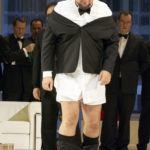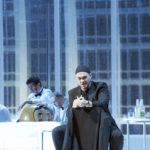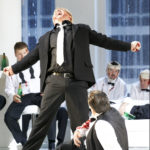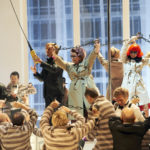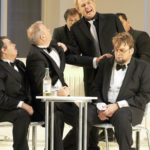- Sorin Coliban
- Christopher Maltman
- Didyk, Pecoraro
- Eiche, Jelosits, Ellen
- Pecoraro, Lippert, Didyk, Ellen
Janacek’s last opera was composed before the libretto was ready, the text unusually constructed, and unfamiliar in form. The ‘Community of the Nameless’ was for Janacek the most important element of the opera, a work with, unusually for Janacek, exclusively male singer parts. Fundamental to the opera is the saying, ‘in every creature a spark of godliness’.
I was fortunate to see Welsh National Opera’s acclaimed 1990s staging of From The House of the Dead inspired in its use of Stalin’s Gulag. Its setting of Siberian labour camps shocked us, both with the extremity of Siberian location, as well as the mix of political prisoners and criminals documented. Their interaction in a cut-off community so inspired Janacek in setting Dostoyevsky’s text.
Vienna Staatsoper’s director Peter Konwitchny has other ideas. He justifies a contemporary setting, ‘to show the social mechanism of a closed group.’ We are not so easily shocked by Siberian connotations; historicism has been overdone, he argues. (Given the political oppression in Putin’s Russia , or China , one could argue a more literal interpretation is still relevant.) For Konwitchny (interview Prologue) there are more subliminal prisons. His production intends to show such a closed society as a party of Mafia. And once you enter, there is no way out. This party takes place on the 44th floor of a skyscraper. These people have a floor let, and perform their infantile, evil games on each other.
Janacek’s opera is structured to link different convicts’ stories, mediated by leader Alexander: from Skuratov’s, constantly interrupted; Luca’s, who’d stabbed a major; Siskov’s memories of his wife; and Alexander is teaching Aljeja to read.
It’s the role of a director, so Konwitchny, to bring the audience nearer to the heart of a work, and to free them from out of their comfort zones. But events on stage bear little relation to any narrative structure.
The safety curtain shows a still view of Karlsplatz opposite Vienna Opera House. The now-moving traffic provides a filmic backdrop to Janacek’s overture, its Slavonic accents problematised by traffic. Curtain lifted to reveal, brilliantly lit, a luxurious penthouse suite in creamy white, with slick white leather sofas, chrome bar tables, and matching white-backed chairs: a bar on one side, games machine and dart board opposite. The playground for Mafia lounging and jousting.
‘Piss off …You haven’t had a sh…g for a while’ (so the English translated subtitles, until they break down.) ‘You’re an arsehole, not a king’. Alexander (Sorin Coliban), the boss, his glasses removed, is punched, debagged and horsewhipped, while another Mafia photographs him from above.
The problem (with Konwitchny) is Janacek’s sublime music, soloists and chorus, are subverted by what we see on stage: off-cuts of scenes out of a Tarantino (Reservoir Dogs) set. One mobster fights his way through the front stalls and plays havoc, dancing with some of the audience. And frightening an irate couple, man and wife, protesting, out of their seats to the side exit.
Were the titles intentionally sabotaged? We really cannot understand what is going on; or follow the life stories related by successive inmates. Like Luca’s story, sublimely sung by Misha Didyk, of how he escaped the hangman’s noose.
Now the sides of lower house are lit up, doors open to exits, inviting , or perhaps defying, the audience to leave. This surely contradicts the claustrophobic effect Konwitchny intended!
And now it’s party time. Alexander is pulled out of his chair. The chicks are coming. The men, in sharp, black trousers and white shirts, now don convict striped tops , and wave chains. Three call girls appear- ridiculous in an all-male cast (as intended). The poetry and lyricism of Janacek’s music break through somehow as background. Skuratov’s (Herbert Lippert) story is eventually completed, of how he shot the rich rival to his beloved Luisa . Yet it’s sung like an angel by Lippert.
The ‘play’ put on- rather a seedy sex review- features pole dancers, a female stripper; then muscular male dancers, or strippers. It all goes on far too long.
Until with Siskov’s (Christopher Maltman) story of Akulka, we at last have a sense of Janacek’s opera. The men are sitting attentively, listening and reacting to another man’s story. There is a murmuring men’s chorus in the background. Was Akulka, abandoned by Siskov’s best friend, a whore – Akulka, whose throat Silkov slit in revenge. Magically sung by English tenor Maltman, in black skullcap, Maltman’s Staatsoper debut was enthusiastically applauded.
Alexander is led back on his knees, pulled along like a dog on a chain. And is persuaded to grant Siskov his freedom. `Resurrection from the dead. Liberty, sweet liberty`, these are the closing words: a message of forgiveness testifying to the enduring free spirit of man. But the horseplay on stage is a travesty of Janacek s intentions.
Yet for all this, Franz Welser-Möst and the Vienna State Opera orchestra did justice to Janacek’s intense and moving score. And the cast, individual singers and corporately, and Vienna Staatsoper chorus, could hardly have been bettered. But the staging under Konwitchny’s direction did Janacek’s wonderful text no favours. I’m sorry, Herr Welser-Möst, you are Vienna Staatsoper’s General Music Director. You as conductor could best see everything happening on stage, if not off-stage. You should have pulled, or perhaps demanded revisions of this production.
30.12.2011
From the House of the Dead (Aus einem Totenhaus) December 2011
from left, clockwise
Herwig Pecora (the very old convict), Herbert Lippert (Skuratov), Misha Didyk (Luka Kusmitsch), Sorin Coliban (Gorancikov);
Christopher Maltman (Siskov); Marcus Eiche (Don Juan), Peter Jelosits (Kedril), Donna Ellen (Dirne); Misha Didyk (Luca), Herwig Pecora;
Herbert Lippert (Skuratov)
All photos as above © Wiener Staatsoper/ Michael Pöhn

